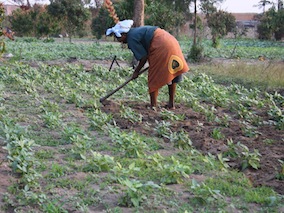NAIROBI, Jan 20 (IPS) - A growing number of African countries are making significant progress towards eradicating extreme hunger and poverty. Ghana, Liberia, Malawi, Rwanda, Sierra Leone and South Africa are some of the countries that have made tremendous achievements towards achieving these goals.
In Ghana over the last 15 years the number of food insecure people has significantly decreased from 34 percent to eight percent. The country’s school feeding programme reaches one million children, according to data from this West African nation’s Ministry of Agriculture.
Since the decade-long civil war ended in 2002, Sierra Leone has dramatically increased its arable land to nearly 1.8 million hectares, consequently reducing the number of people going hungry by nearly 10 percent, also according to data by the country’s Ministry of Agriculture.
Agriculture, in many African countries, is the bedrock of Rwanda’s economy. According to the country’s Ministry of Agriculture and Animal Resources, the sector generates 45 percent of export revenue and accounts for an estimated 90 percent of all food consumed.
George Nderi, a market analyst in Nairobi, explained: "In the last five years, Rwanda’s agricultural sector has been growing at an average of 4.5 percent, contributing an estimated 36 percent to the overall GDP, the highest in East Africa." He said that both Kenya and Uganda’s agricultural sectors contributed an estimated 24 percent to the country’s GDP, with Tanzania contributing 25 percent.
According to the World Bank, Rwanda’s economy is growing at a healthy rate of 7.8 percent, at least two points ahead of the East African Community. "It is imperative to note that some drought-prone countries have also reduced their number of food insecure people. In Ethiopia, for instance, in the last year the number of food insecure people has decreased from 5.2 to 3.2 million, reducing nationwide malnutrition by 32 percent," Nderi said.
According to the 2011 Ethiopian Demographic and Health Survey, deaths of children under the age of five stood at 20 percent in 1990 but have fallen to 8.8 percent. Malnutrition accounts for at least half of these deaths according to the World Health Organization.
Amos Kiptanui, a small-scale farmer in Kenya’s Rift Valley Province, which is also known as the country’s breadbasket, said that these positive steps have been as a result of financial and political commitment to eradicate hunger and malnutrition. "Rwanda was the first country in Africa to sign on to the Comprehensive Africa Agricultural Development Programme (CAADP). The country has also doubled its expenditure on agriculture to the current 10 percent meeting the CAADP policy framework," he said. (END/2012)


No comments:
Post a Comment